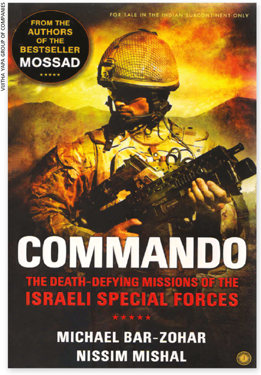BOOKRACK
By Vijitha Yapa
 The authors of the best seller Mossad are back with another true-life thriller with details of episodes that made the Israeli Special Forces (ISF) famous throughout the world for their death defying actions.
The authors of the best seller Mossad are back with another true-life thriller with details of episodes that made the Israeli Special Forces (ISF) famous throughout the world for their death defying actions.
At a time when the world is abuzz with US President Donald Trump’s decision to recognise Jerusalem as the capital of Israel, these Special Forces will have their hands full catering to new events that are destined to unfold in the coming months.
Its opening chapter on Jerusalem and how the Israelis forced themselves through a 400 foot sheer drop to connect two roads in 1948 makes for fascinating reading. At the time, the Jewish part of the city was under siege and surrounded by Jordan’s elite Arab legion.
The Governor of Jerusalem Dov Yosef had said the city’s entire stock was five days of margarine, four days of noodles and 10 days of dried meat. Stringent rationing meant a tin of sardines every two weeks, 100 grammes (g) of legumes and 50g of rice. Their existence would have been seriously under threat if Jerusalem fell but the Israelis were able to build a new road (initially nicknamed ‘the Burma Road’) and defy the siege.
But there were reverses in luck too like the accidental killing of General David Marcus by friendly fire. He was the first Israeli general to be appointed by Prime Minister David Ben-Gurion. The Israelis adopted a new policy where in the event of a terrorist attack, the country from where the terrorists came would face the consequences and its military bases would be attacked.
One wonders what our fate would have been if Sri Lanka had adopted that policy during the civil war and attacked India. We would probably be speaking Hindi by now!
Details of the operations carried out by ISF provide insights into different opinions within Israel’s cabinet and even the commanders of the forces about taking decisions on their own. One of the best examples of this was Operation Kadesh in 1956. The intrigue of Western powers using covert means to achieve their ends are revealed in the book.
French, British and Israeli leaders had met secretly in France to work out a plan to take over the Suez Canal from Egypt, which had nationalised it not long before then. The Israeli forces that were despatched to carry out the first attack were not told about the secret decision of France and the UK, who were to join and participate in the attacks on the Suez. The Israelis launched the attack in the Mitla Pass and decided to go further despite being told by their high command not to advance.
While Israel succeeded in the Sinai, the British and French forces failed in their mission. Israeli Chief of Staff Moshe Dayan angrily accused Ariel Sharon who was the Commander of the Israeli Army of losing lives in an unprepared battle. Meanwhile, Prime Minister David Ben-Gurion refused
to take sides and sent Sharon into virtual exile.
The Six-Day War in 1967, which wiped out the air forces of Egypt and its Arab allies, is also described in detail in this book. Israeli forces had 264,000 troops, 800 tanks and 300 combat aircraft. They destroyed several hundred Egyptian, Jordanian, Syrian and Iraqi aircraft, and lost 46 of their own aircraft. An Israeli pilot was to write: “God is with the Jews – the burning bush and the burning tanks are in Sinai.”
Originally, the Israelis had only meant to capture Sinai and not East Jerusalem as well. They had tried to tell King Hussein of Jordan not to attack Israel, not realising that the king had already signed a pact with Egypt.
So when Jordan attacked Israel, the latter used the opportunity to occupy East Jerusalem too. The June war established the supremacy of the Israelis and led to many legends about their powers. But behind it all was a major cry by Israelis who called for the survival of their homeland at all costs.
The book describes the survival of Israel – and the battles that took place – and helps explain the politics, wars and tribulations of the scenario in the Middle East today. What is also clear in these operations is that meticulous strategic planning is important. The events described are significant for us too in order to learn from what happened in Sri Lanka because incredibly, despite the disunity and mistrust between the army and navy, and our political leaders, we won the war.
Perhaps one day, the detailed planning that led to Sri Lanka’s victory over the LTTE will be revealed. Major General Kamal Gunaratne’s book Road to Nandikadal provides many accounts of the battles he fought but the overall picture involving the army, navy, air force and intelligence services with detailed maps awaits release.




